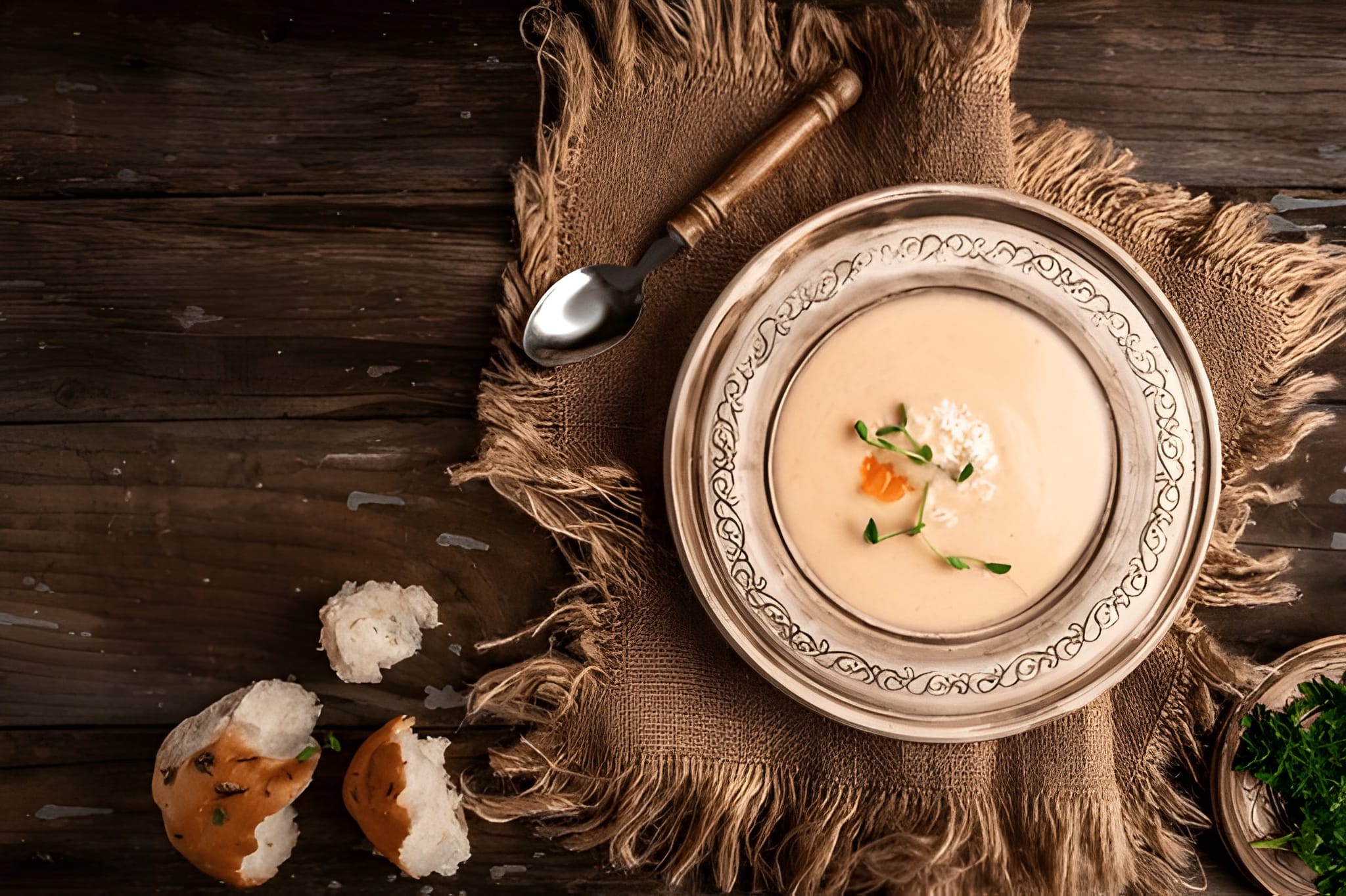Ajoblanco, often called the “white gazpacho,” is a traditional cold soup from Andalusia in southern Spain. This refreshing dish is made with ground almonds, garlic, stale bread, olive oil, and a touch of vinegar, resulting in a smooth, creamy texture and a subtle nutty flavor. It’s a perfect choice for hot summer days when you crave something light, chilled, and nourishing.

Ajoblanco (Cold Spanish Almond Soup):
Deeply rooted in Spain’s Moorish heritage, Ajoblanco dates back centuries and is believed to predate the more famous tomato-based gazpacho. It was once considered a peasant dish, made from simple pantry ingredients, but over time it gained popularity as a gourmet delicacy found in Spanish restaurants. Today, it’s often served with grapes or melon, balancing the savory and sweet elements beautifully.
History:
Ajoblanco originates from Andalusia and Extremadura, regions known for their Mediterranean climate and abundant olive groves. The dish reflects Spain’s Moorish influence, combining almonds—introduced by the Moors—with garlic and bread, staples of Spanish cuisine. Traditionally prepared in mortars, it was a humble meal made by shepherds and farmers who relied on preserved ingredients. Over time, chefs refined the recipe, making it a beloved symbol of Spain’s culinary past and its inventive simplicity.
Subscribe to our youtube channel Kitchenpedia for more delicious recipes and hit the like button if you enjoyed this youtubevideo. Share it with your friends and Family.
Ajoblanco
Ingredients
- 1 cup blanched almonds
- 2–3 cloves garlic
- 2 cups stale white bread (crust removed, soaked in water)
- 2 tablespoons sherry vinegar (or white wine vinegar)
- 3 cups cold water (more as needed for consistency)
- Salt to taste
- Green or red grapes (for garnish)
- A drizzle of olive oil (for serving)
Instructions
- Soak the Bread: Soak the stale bread in water for a few minutes until softened. Squeeze out the excess water.
- Blend: In a blender, combine almonds, garlic, and soaked bread. Blend until finely ground.
- Add Liquids: Slowly add olive oil, vinegar, and cold water while blending until the mixture becomes smooth and creamy.
- Season: Taste and adjust with salt and vinegar to balance the flavors.
- Chill: Refrigerate for at least 2 hours to allow the flavors to meld and the soup to chill completely.
- Serve: Pour into bowls, garnish with grapes and a drizzle of olive oil, and serve cold.
Notes
- Use high-quality extra virgin olive oil for the best flavor.
- You can substitute almonds with blanched hazelnuts for a twist.
- Adjust the consistency with more cold water if the soup is too thick.
- Traditionally, white grapes are used, but green ones add a nice tart contrast.
- Serve well-chilled — it tastes best cold on a hot day.
Tips for Ajoblanco:
- For a smoother texture, strain the soup through a fine sieve before chilling.
- Add a few ice cubes before serving to keep it extra cold.
- Use day-old rustic bread for authentic flavor and texture.
- Toast the almonds lightly for a deeper nutty taste.
- Pair with crusty bread or a crisp white wine for a complete meal.
FAQs for Ajoblanco:
Q1: Can I make Ajoblanco ahead of time?
Yes, you can prepare it a day in advance. The flavors improve as it chills overnight.
Q2: Is Ajoblanco vegan?
Yes, it’s naturally vegan and dairy-free, perfect for plant-based diets.
Q3: Can I use almond milk instead of almonds?
It’s not recommended. Whole blanched almonds give the soup its creamy, authentic texture.
Q4: What can I use instead of sherry vinegar?
White wine vinegar or apple cider vinegar works as a substitute.
Q5: How long does Ajoblanco last in the fridge?
It keeps well for up to 3 days when stored in an airtight container.
Conclusion:
Ajoblanco is a timeless example of how simple ingredients can create culinary magic. This cold Spanish almond soup embodies Mediterranean freshness and rustic charm, offering a creamy, garlicky, and nutty delight that cools the senses. Serve it on a summer afternoon with grapes and olive oil — and taste the elegance of Spain’s Andalusian heritage in every spoonful.

